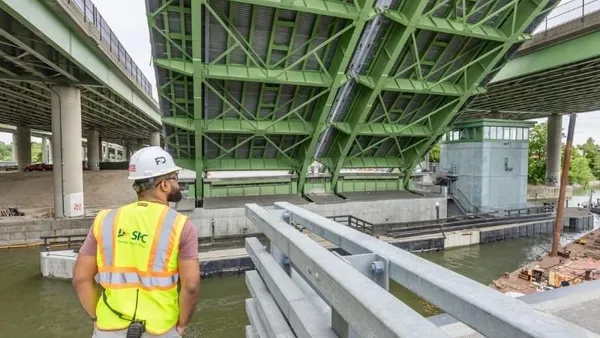Dive Brief:
- Rep. John Larson, a Democrat from Connecticut, and Rep. Kenny Marchant, a Republican from Texas, have introduced the "Invest in America Act," an infrastructure initiative that could draw $125 billion in investment and create 284,000 jobs, according to the American Institute of Architects (AIA) and The Real Estate Roundtable.
- The proposed legislation would repeal the “Foreign Investment in Real Property Tax Act (FIRPTA),” along with the capital gains that foreign investors must pay when they finance U.S. real property. Supporters say the new law would make the prospect of financing new construction and renovations of infrastructure — i.e., Opportunity Zones, affordable housing, roads, bridges, hospitals and airports — more attractive to global investors.
- The proposed bill has drawn bipartisan and industry support through the Invest in America Coalition, members of which include the AIA, The Blackstone Group, the Real Estate Board of New York, Starwood Capital Group and The International Union of Painters and Allied Trades.
Dive Insight:
More avenues for investment in the U.S. construction industry means more opportunities for contractors. After a partial appeal of FIRPTA in 2015, according to the AIA, foreign investment in both large and small U.S. cities increased by 33%, creating jobs in all areas of the design and construction industry.
The Invest in America Act, then, could help state, city and county entities help secure federal funding for their projects since President Donald Trump’s administration has made it clear that federal dollars will favor those local projects that have arranged for non-federal sources to foot most of the bill. The administration underscored this approach in the president’s most recent budget proposal in which he included $200 billion for infrastructure spending, an amount meant to help draw more than $1 trillion or so of additional investment.
But relying on money sourced in another country can translate to problems locally. Construction on the $1 billion Chinese-backed Oceanwide Plaza mixed-use project in downtown Los Angeles stalled for more than one month among claims of unpaid bills. This took place against a backdrop of a slowing economy in China and pressure on developers from that country to invest domestically rather than abroad.
When general contractor Lendlease suspended work in February, there were mechanic’s liens totaling more than $60 million filed against the project. When construction started back up again in March, some of those bills had been paid, but new claims pushed the lien total to almost $100 million.













